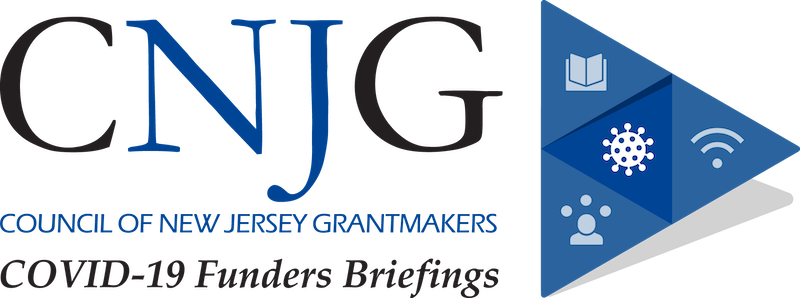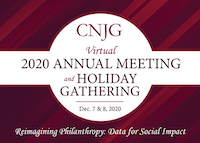Site Search
- resource provided by the Forum Network Knowledgebase.
Search Tip: Search with " " to find exact matches.
On this webinar, the conversation focused on the local news landscape with guests from Chalkbeat Newark, WBGO, and the Dodge Foundation. Additionally, attendees heard a quick briefing on Newark’s efforts to encourage social distancing from Director of...
African Americans make up just 14% of New Jersey’s population, but they account for 21.3% of COVID-19 deaths, according to state fatality figures. This disparity is due to a number of factors which existed long before the coronavirus pandemic hit our...
On this webinar, we heard from McKinsey on the disproportionate impact of cOVID-19 on communities of color, as well as longer-term implications and solutions. Representatives from McKinsey discussed their report entitled “COVID-19: Investing in Black...
As New Jersey enters its 9th week of sheltering in place and the close of businesses deemed non-essential, we have already seen the impact of policy decisions and the immense and growing need in our communities. The sheer number of people stricken...
On this webinar, speakers focused on mental health during this difficult time. Our speakers included Steve Margeotes from Main Street Counseling, Sonia Rodrigues-Marto from Rutgers University Behavioral Health Care, and Ron Chaluisan from the Newark...
On this webinar, the conversation focused on the future of education. Panelists discussed challenges and adaptations, contingency planning, and what this moment can teach us about how best to educate kids moving forward.
Speakers...
CNJG is pleased to offer this series of webinars to our members, hosted by our partners at the Center for Disaster Philanthropy.
With COVID-19 there seem to be more questions than answers, particularly for funders who want to respond...
CNJG is pleased to offer this series of webinars to our members, hosted by our partners at the Center for Disaster Philanthropy.
With COVID-19 there seem to be more questions than answers, particularly for funders who want to respond...
Newark funders joined this webinar for an engaging discussion with a great panel of small business leaders/entrepreneurs in Newark, who discussed the impact of COVID-19 on the small business community and considerations for re-opening.
...
Joint Statement from CNJG and the Center for Non-Profits
This statement also appeared on...
The Council of New Jersey Grantmakers is the center for philanthropy in New Jersey, serving the leading independent, corporate, family and community foundations as well as public grantmakers of our state. We support our members by strengthening their...
Since formally organized as a 501(c)3 non-profit in 1997, CNJG has been actively engaged in a number of landmark initiatives including commissioning the first study of giving in the Garden State, NJ Gives, the first study of nonprofit health...

CNJG hosts regular briefings where funders hear from government officials, disaster recovery and...

CNJG’s Newark Philanthropic Liaison, Kevin Callaghan, organized a series of webinars for our Newark...
The effects of COVID-19 continue to be felt all around New Jersey. In order to dig deeper into the impact of the pandemic on certain communities and stay connected during this difficult time, CNJG worked with our affinity group chairs and other...
To dig deeper into causes of, and responses to, structural racism within philanthropy in New Jersey, the Council of New Jersey Grantmakers established a Racial Equity Task Force made up of leaders at CNJG member organizations.
The task force’s...
What are the biggest needs and challenges New Jersey communities face as result of the pandemic?
- It starts with the basics: food and shelter, medical equipment such as masks for long-term care facilities,...

Please Log In to view resources from this event.
Reimagining Philanthropy: Data for Social...
Learn how to meet ongoing critical needs, support resiliency, and prepare for COVID-19 recovery.
COVID-19 is not your “typical” disaster. There are still many unknowns about the pandemic’s full impact and how long restrictions on...
Explore how philanthropy can empower organizations led by people of color, advocate for structural change, and confront the impacts of white dominant culture during COVID-19.
With the ongoing spread of coronavirus, protests demanding racial...
